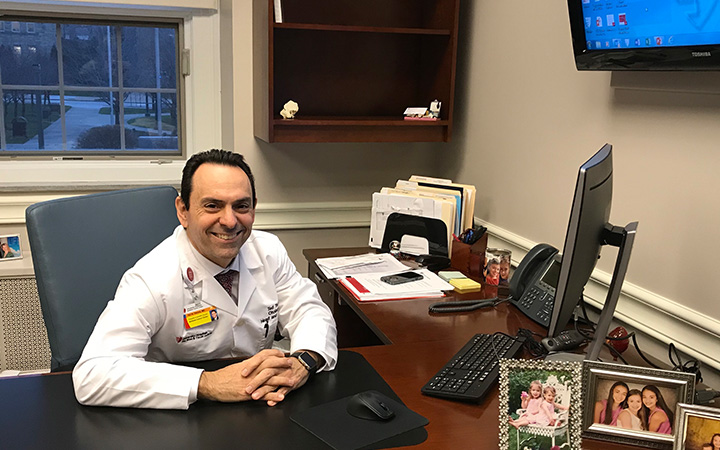The Challenge of COVID-19 for Cancer Patients With Weakened Immune Systems
June 09, 2020

Cancer care has changed in the era of COVID-19.
“We’re adapting with the times,” says UH Seidman Cancer Center President Ted Teknos, MD. “It’s remarkable to see how quickly our cancer community has adapted. During this most sensitive and important time in their lives, in no way, shape or form will this stop our ability to deliver life-saving care.”
At one time, “You have cancer” were the scariest words a patient could hear, and yet the current pandemic presents a rival concern, Dr. Teknos says.
Cancer patients are twice as likely to be infected by COVID-19, twice as likely to end up in an intensive care unit and face double the mortality rates of the general population. Since relative immunosuppression can last up to 20 years after cancer treatment, even cancer survivors no longer in active treatment are more susceptible to the new coronavirus.
“When you’re a survivor, your immune system has been altered, so cancer patients are at a higher risk,” Dr. Teknos says.
Safeguards
Oncologists and other cancer healthcare providers are taking steps to ensure that cancer patients, who are vulnerable because of their weakened immune systems, are safe.
For example, at UH Seidman Cancer Center, every person, including patients, staff and physicians, is screened for temperature and flu-like symptoms and masked before being allowed to enter the facility. No one may congregate in waiting areas, and a clear shield protects the people working at the registration desk. All seating is spaced six feet apart to ensure strict physical distancing, and cancer patients may not bring anyone with them to appointments. Before essential cancer surgery, patients are tested for COVID-19, because even asymptomatic patients can test positive.
“Cancer patients have to be extra careful because their immune systems are not as effective,” Dr. Teknos says.
At UH Seidman, patients continue to be enrolled in clinical trials, often through Zoom or Skype. One Phase I trial for solid tumor patients has been expanded to include COVID-19 patients because the treatment has anti-cancer as well as anti-viral properties.
Limiting Exposure
For cancer patients with symptoms of COVID-19, UH has created a COVID Rule-out Clinic on main campus, separate from the main Emergency Department, to care for this more vulnerable population. Through this clinic, staff can obtain the necessary blood work and imaging exams.
“We try to keep our cancer patients out of the EDs through this special clinic,” Dr. Teknos says. “When patients are virus-free, we get them back on their road to recovery from cancer.”
Dr. Teknos encourages cancer patients to follow U.S. Centers for Disease Control CDC) and Ohio Department of Health (ODH) advice to wear masks in public, and to follow handwashing and physical distancing guidelines. This will put cancer patients at a much lower risk of acquiring coronavirus while out in public, he says.
Caregivers of cancer patients who must leave the house for work should remove their clothes and shoes before entering their homes at day’s end and to shower before interacting with family members, Dr. Teknos says. He also recommends wearing masks around cancer patients to protect them.
Don’t Overlook Worrisome Symptoms
Dr. Teknos said physical distancing recommendations will relax when we can see who has immunity to the virus, which is anticipated in those who have been exposed to and recovered from COVID-19.
“I think our world is going to be very different,” he says. “It will be challenging to return to normal without social distancing, and without a vaccine.”
His biggest worry? That while people are discouraged from leaving home for anything but “essential” matters like grocery and pharmacy runs, some may fail to seek care for worrisome symptoms.
“Treatment should only be delayed if doing so does not affect the patient’s overall ability to beat their cancer,” Dr. Teknos says.
“If you feel something concerning, don’t wait until this pandemic is over,” Dr. Teknos says. “Health care is still open. Cancer centers are continuing life-saving care.”
Related links
At University Hospitals Seidman Cancer Center, our team of caregivers provides the most advanced forms of cancer care -- from prevention, screening and diagnosis through treatment and survivorship. Our disease-focused teams design personalized cancer treatment plans for every patient who entrusts their care to us. Learn more about cancer care at UH Seidman Cancer Center.


